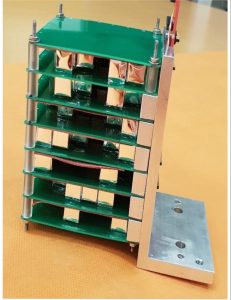Discovering Gamma
A system that detects high-energy γ-ray eruptions in distant galaxies, developed under the leadership of Professors Ehud Behar and Shlomit Tarem, will be launched to the International Space Station
An experiment planned and built in the Faculty of Physics at the Technion will be launched to the International Space Station. Called GALI (Gamma-ray Burst Localizing Instrument), the experiment is an innovative gamma-ray (γ-ray) detection system. Placing the system on the space station will help identify the γ-ray radiation that originates from high-energy eruptions in distant galaxies.
It is widely assumed that short γ-ray bursts come from the fusion of two neutron stars, an event that also produces gravitational waves. However, to date, only one such event has been identified (in2017), hence the importance of the development of new detection tools. The detector developed in the Faculty of Physics is based on hundreds of small crystals arranged in a unique 3D pattern. Based on the relative signal received in each crystal, it is possible to reconstruct the location of the eruption with high accuracy.
Led by Professor Shlomit Tarem and Professor Ehud Behar, the research team also includes Ph.D. student Roi Rahin, master’s student Julia Salah, undergraduate Solomon Margolin, research assistants Alex Vdovin and Amir Feigenboim, systems engineer Avner Kaidar, and Hovhannes Agalarian from the Asher Space Research Institute.
“The main innovation in our system is in accurately identifying the location of the eruption,” Prof. Tarem said. “Such identification would allow astronomers around the world to direct telescopes to the event, study the eruption and link it to other events such as gravitational waves. Thanks to this unique arrangement, GALI will provide more accurate results than existing detectors, even though its dimensions are much smaller.”
GALI may have applied importance in other areas. According to Prof. Behar, “We found out that the system we developed is also interesting to people outside the world of astrophysics. Our collaborators in the Nuclear Research Center Negev, for example, want reliable and accurate systems that detect radioactive sources from afar. The system we have developed will be able – with required adjustments – to help locate such sources with high accuracy. In these contexts, the system also provides information about the emitting substances; so, it may help to adapt the optimal treatment. This is the context in which we submitted a joint U.S. patent.”
The GALI experiment is one of 30 Israeli experiments which are managed by the Ramon Foundation for the Rakia mission. The GALI test is scheduled to take off for the International Space Station on May 2022 with the SpX – 25 flight and will be accompanied by the Rakia Mission and supported by the Ministry of Innovation, Science and Technology.
Watch a video explaining the experiment (and others):




